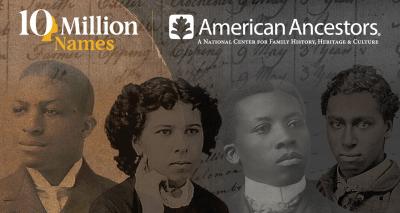10 Million Names: Recover, Restore, Remember

Image from 10 Million Names
“Every time the long-forgotten people of the past are remembered, they are born again!
~ Mehmet Murat ildan, Contemporary Turkish playwright, novelist and thinker
The mission of Ending Racism USA is apparent in its name. The call to end racism in the United States draws us forward, enlisting allies, researching, forming strategies, collaborating with other organizations, working to eliminate race-based injustices that should have no place in our society. As we heed that call, there are also times when we must address the lingering consequences of hundreds of years of racism.
Between the 1500s and 1865, an estimated 10 million people of African descent were enslaved in what is now the United States of America. People were ripped away from their families, their livelihoods, and their very identities on one continent and forcibly dragged to another. Then, among all the horrors and indignities they would face, they were robbed of their names, deprived of any education, and made to forget their history. Since slaves were considered property rather than people, genealogical information about enslaved Africans was deliberately obscured, altered, or not recorded at all.
One of the consequences of that total disregard for their personhood is that untold millions of the descendants of those enslaved people have little or no idea of their lineage. How would you go about finding information about an enslaved ancestor who lived in the United States prior to the Civil War? Where would you look? Who would you ask? Personally, 15 years ago, I couldn’t even locate a half-sister I spent a lifetime not knowing I had. My parents were deceased, there was no family to ask, no family documents to be found, and the State of Indiana had sealed adoption records. I was blocked before I could even begin.
Now there may be a way for people to find their enslaved ancestors. The project, 10 Million Names, is building a free, public-facing, searchable online collection of family history documents. Launched in August of 2023, the project seeks to recover the names of as many as 10 million people who were enslaved in America before the Emancipation and locate their living descendants. The term “tall order” doesn’t even begin to describe the scope of that goal, but American Ancestors, a national center for family history, and a highly impressive group of collaborators intend to do just that.
Partnering with family historians, leading African American Scholars, and cultural institutions, American Ancestors intends to centralize genealogical and historical information about enslaved people and their families. Dating back to 1845, American Ancestors was originally called the New England Historic Genealogical Society (NEHGS) and was the first genealogical society established in the United States. The free, permanent database for the 10 Million Names project will be available to the public on its website, 10MillionNames.org.
The project uses an extensive network of genealogical researchers, historians and data specialists to pore over archives, libraries, genealogical and historical societies, and other organizations around the world to uncover data about the enslaved people of African descent. Also, several institutions will collaborate with 10 Million Names on the project. Prominent among them are the Afro-American Historical and Genealogical Society, and non-profit genealogical groups, such as FamilySearch International and the National Society of Daughters of the American Revolution.
A press release from American Ancestors in August 2023 provided details about 10 Million Names’ inception and planned approach. “Our collaboration with Richard Cellini on the Georgetown Memory Project served as a model and launch pad for 10 Million Names,” said Ryan Woods, Executive Vice President and Chief Operating Officer for American Ancestors. “The work done on the Georgetown project demonstrated we could apply a different methodology to help more Americans of African descent recover their family history before 1870, which is often difficult. Community-based family historians will play a vital role in the success of this project. 10 Million Names will work alongside families, individuals, and organizations to amplify the voices of people who have been telling their stories for hundreds of years.”
To help facilitate the project, a Scholars’ Council, a Genealogists’ Council, and an Advisory Board have been assembled. Each group includes leading authorities with unparalleled expertise, insights into African American history, research methodologies, emerging advancements in technology and datasets, and connections to vast networks and philanthropic organizations. However, besides all these formidable resources, the project requires something else – the public’s help.
Members of the public are invited to go online at 10MillionNames.org and share information about their families – whether they were enslaved or were persons who enslaved others. The project is looking for research notes, memories, oral histories, photos, traditions, family records from a religious text (such as records kept in a family Bible), and genealogical materials. Such items will help build a legacy of information for future generations and provide important truths about African American genealogy and history.
People are invited to go online and fill out a family questionnaire or even talk with a genealogist for free. Service is available Monday through Saturday, 9:00 a.m. – 5:00 p.m. E.T.
